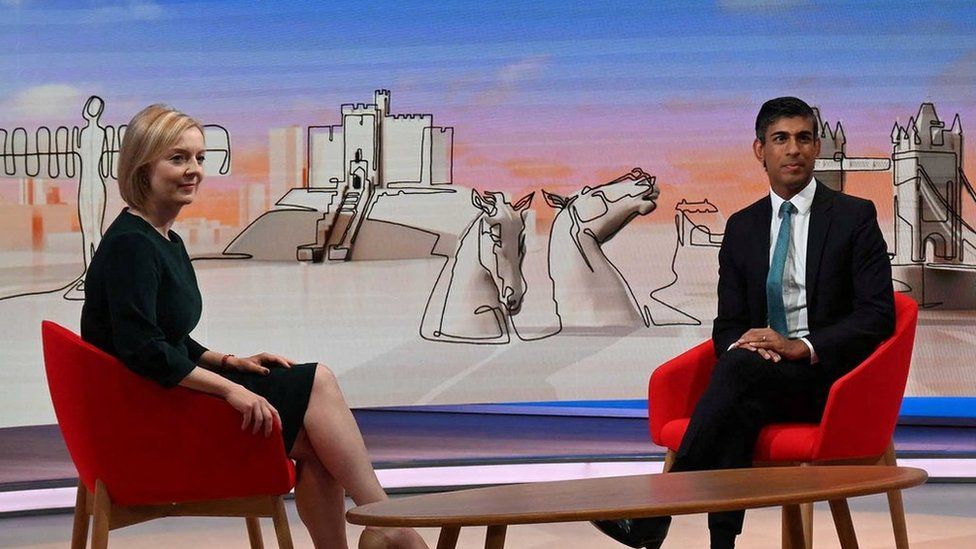Truss and Sunak: Solar panels, tax and other claims fact-checked
The two excess contender to be state leader were on the BBC's Sunday with Laura Kuenssberg.
Liz Truss and Rishi Sunak were tested about what backing they'd give individuals confronting high energy bills and how they'd track down the billions of pounds to do this.
Liz Truss vows energy plan in seven days on the off chance that she becomes PM
Here are a portion of their cases.
'Last time we quit raising organization charge we saw the incomes increment' - Liz Truss
Organization charge - an expense on organization benefits - is because of ascend from 19% to 25% next April - an arrangement formulated by previous chancellor Rishi Sunak.
Liz Truss needs to drop this increment. Her thought is that keeping charges lower increments financial development, and that implies how much cash the public authority gets from the expense increments despite the fact that the rate is lower.
Be that as it may, the financial research organization the Institute for Fiscal Studies (IFS) has cautioned against this suspicion saying: "The impact would surely not be large enough for the tax break to pay for itself".
The public authority gauges that dropping the ascent would cost £17bn every year, albeit that doesn't consider any expanded venture or organizations choosing not to migrate or burn through cash on charge arranging.
The IFS said that the way that charge incomes had increased in 2019 regardless of lower title paces of company charge (it was diminished to 19% in 2017) didn't give proof that cutting rates naturally raised more incomes.
It said there were different variables included, including the UK's proceeding with recuperation from the monetary emergency.
Furthermore, financial development remained somewhat low, in spite of the quit raising in organization charge rates.
Support v Sunak reality checked
For what reason did Liz Truss U-turn over open area pay?
'We have really insurance for these individuals' - Rishi Sunak
Mr Sunak was found out if individuals who couldn't cover their energy bills ought to be cut off.
That's what he's right if energy organizations have any desire to detach the inventory of a not covered a client bill following 28 days there are limitations on that.
They would have to allow the client an opportunity to clear their bill through an installment plan and they might have to apply to a court for a warrant to enter the property to disengage the stockpile.
Likewise governs forestalling specific weak individuals are being disengaged -, for example, individuals of state annuity age who live alone or individuals who live with youngsters.
As per figures from the controller Ofgem, 21 families had their stockpile separated a year ago. Providers will more often than not move clients to prepayment meters all things considered.
Ms Truss multiplied down on her remarks during the administration crusade that ranchers' fields shouldn't be "brimming with sun powered chargers".
It's not satisfactory how enormous an issue this truly is, albeit a few Conservative MPs have raised it.
Sun powered ranches in the UK as of now represent 0.08% of absolute land use. We've asked the National Farmers' Union (NFU) the amount of this is rural land.
Under the public authority's net zero plans, sun powered ranches could ascend to an expected 0.6% of all land use. Sun oriented Energy UK says this would be not exactly how much land at present utilized for fairways.
There are five classes of rural land, positioned by quality.
Right now, the direction for nearby specialists is that sunlight based ranches ought to be based on "moderate quality" land, meaning their effect on food creation would be restricted.
The NFU, which refers to sunlight based projects, "a decent expansion choice as" for ranchers, says: "The NFU's inclination is that sun powered ranch improvement is situated on lower quality rural land, keeping away from the most useful and flexible soils."
'The last time I stood up and did a spending plan, really the public funds were on a direction back to supportability' - Rishi Sunak
Mr Sunak conveyed his keep going financial plan on 23 March, which was three and a half months before he surrendered as chancellor.
At that point, the Office for Budget Responsibility (OBR), which makes free gauges for the public authority in light of its strategies, was at that point advance notice that Russia's attack of Ukraine and the going with ascends in energy costs "will weigh vigorously on a UK economy that has just barely recuperated its pre-pandemic level".
The OBR allowed him a 58% opportunity of meeting his objective of having government obligation falling as an extent of the size of the economy by 2024-25.
It allowed him a 66% opportunity of accomplishing a reasonable current financial plan by 2024-25, which would mean the public authority just getting cash to contribute.
Obviously, the public funds have crumbled extensively from that point forward, and Mr Sunak declared another £15bn of measures to facilitate the typical cost for most everyday items emergency two months after the Budget.
For the long stretch of May, when Mr Sunak was still chancellor, the OBR said that administration getting had been surprisingly. That was halfway because of a major expansion in the public authority's advantage installments because of higher expansion.

Comments
Post a Comment